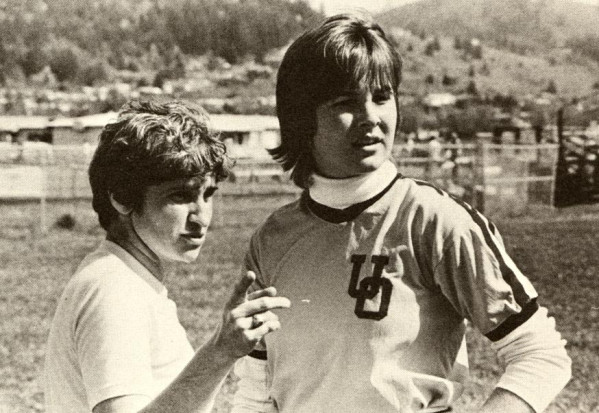( b 1939 – ) Years at UO:1965-1979
Woman of Willpower
 “Where there’s a will, there’s a way.” No one embodies this phrase more than Becky Sisley. The Seattle, Washington native played an instrumental role in the progress of women’s athletics not only at the University of Oregon, but also across the nation. After receiving her undergraduate degree from the University of Washington she taught one year at Lake Washington High School in Kirkland and then earned her master’s from the University of North Carolina at Greensboro (UNCG). From there she taught two years at the University of Wisconsin in Madison. During her 1971-72 sabbatical she completed her doctorate at the UNCG.
“Where there’s a will, there’s a way.” No one embodies this phrase more than Becky Sisley. The Seattle, Washington native played an instrumental role in the progress of women’s athletics not only at the University of Oregon, but also across the nation. After receiving her undergraduate degree from the University of Washington she taught one year at Lake Washington High School in Kirkland and then earned her master’s from the University of North Carolina at Greensboro (UNCG). From there she taught two years at the University of Wisconsin in Madison. During her 1971-72 sabbatical she completed her doctorate at the UNCG.
A Go-Getter from the Beginning
Sisley joined Oregon’s Physical Education Department as an instructor in 1965, transitioning into an assistant professor role two years later. In addition to her classroom duties, Sisley coached basketball during her first year, and field hockey and softball for several seasons thereafter. During her first decade at the University, she also served as an advisor for the Women’s Recreation Association (WRA). Her personal athletic experience as a softball and field hockey player and her knowledge as a member of the Division for Girls and Women’s Sport National Executive Committee, positioned her as a natural mentor.
As Oregon revamped its women’s athletic program during the 1970s, Sisley assumed a key leadership role to ensure that the changes aligned with a clear vision for the department. She served as Oregon’s first and only Director of Women’s Intercollegiate Athletics (1973-1979) and led efforts during the 1975-1976 Title IX compliance review. The following year, when women’s athletics, which was housed within the Physical Education Department, merged with the Athletic Department, Sisley remained in her position. Constantly advocating for more funding and better facilities for women, Sisley remained committed to advancing the program despite the obstacles. In 1975-76 all women’s teams were represented at National championships with the exception of basketball. Among her countless feats were her efforts to hire the first full-time women’s coaches, her success in helping push through the first co-ed track and field meet in 1977, her role in the implementation of athletic scholarships for women, and her influence in increasing the women’s budget 11 fold.
Throughout the 1970s, Sisley held numerous positions on the Northwest College Women’s Sports Association, including serving as president in 1977-1978. She was also an influential member of the Association of Intercollegiate Athletics for Women (AIAW).
Shifting Focus while Maintaining Contributions
Despite the strides Sisley made for women’s athletics, after nearly a decade of leading the women’s athletic movement on campus, Sisley decided to shift her commitment.
During the 1979-1980 school year, Sisley stepped down from her position as the women’s athletic director. She chose instead to focus on her role as professor, distancing herself from the financial and administrative challenges facing the athletic department.
During the 1980s and 1990s, Sisley held a variety of positions in the Physical Education and Human Movement Studies Department. She served as the athletic liaison for the Office of Student Affairs and as a counselor for the Office of Academic Advising and Student Services. In addition, she organized the Oregon Women’s Sports Leadership Network (OWSLN) and directed a mentorship program to train women coaches to become athletic directors in the state. She wrote numerous articles on physical education and the intricacies of women in coaching and administrative roles, which were published in a variety of scholarly journals.
Testing her Limits
Sisley also honed her athletic career during the past quarter century. As a natural competitor, Sisley took up the sport of track and field for the first time at the age of 49 in 1988. Since then, she has established nine American-records in her respective age group in four areas (pole vault, javelin, triple jump and long jump). She also captured three world marks. As an active member in the U.S.A. Track & Field Master’s program, Sisley continues to play an instrumental role as an athlete and leader, helping organize competition procedures and event details.
Among Sisley’s countless contributions to the University of Oregon is her unrelenting dedication to improving the athletic platform for women. In recognition of her efforts, she was inducted into the University of Oregon Hall of Fame in 1998. The Becky L. Sisley Award was created in 2000 by the Athletic Department to honor a former female athlete for her professional achievement, community service and support for the University. The Award is comparable to the Leo Harris Award given to a former male athlete. As a coach, administrator, and professor, Sisley strove to level the playing field. Sisley became a Professor Emeritus in 2000 and continues to be a contributor to the sports world as an athlete and advocate. As her last legacy at Oregon, she created and taught the course, Women’s Sports and Gender Equity for several years after her formal retirement.
Fun Facts
- 1966 Women’s Basketball Coach
- 1965-1979 Women’s Softball Coach
- 1967-1975 Women’s Field Hockey Coach
- 1973-1979 UO Women’s Athletic Director